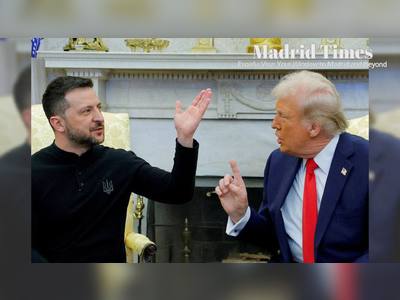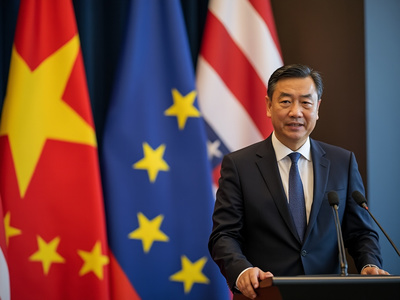
Spanish Prime Minister Sánchez Addresses Global Economic Shifts Amid Trump’s Policies
Pedro Sánchez details the impact of U.S. trade policies on global markets during an Asian diplomatic trip.
Amidst significant changes in the global economic landscape, Spanish Prime Minister Pedro Sánchez is embarking on a diplomatic mission to Vietnam and China, underscoring the impact of U.S. trade policies implemented under former President Donald Trump.
As he travels to Hanoi and Ho Chi Minh City, Sánchez acknowledges a profound transformation in the global order that has evolved over the past 80 years.
In an informal conversation with journalists aboard his plane, Sánchez articulated that Trump's economic strategies necessitate a reevaluation of Spain's and the broader European Union's commercial approaches.
With Spain currently experiencing a robust economic growth rate of 3%, Sánchez is focused on seeking new trade opportunities in Asia while conveying the political ramifications of rising far-right movements in Europe, particularly referencing the Popular Party's (PP) alliances with Vox.
Sánchez's remarks highlight the potential for a 'perfect storm' in the markets, which he believes could be exacerbated by Trump’s miscalculations.
He warned that the ongoing trade tensions are likely to have significant consequences, including increased inflation in the United States and risks of recession.
The Spanish Prime Minister has engaged in negotiations with the PP, indicating a shift in tone between the two major political parties in Spain, and is keen on applying pressure for the PP to distance itself from its far-right partner, Vox.
He states that reconciling the far-right's influence with traditional conservatism is untenable amid the current political climate.
Sánchez expressed strong support for the European Commission's cautious stance under President Ursula von der Leyen, contrasting this with calls from leaders like French President Emmanuel Macron for a more decisive reaction against U.S. tech giants.
He commended von der Leyen for maintaining an openness to negotiations, asserting that a unified European stance is crucial as it confronts Trump’s policies.
Sánchez remains optimistic about the challenges posed by U.S. trade policies, framing them as opportunities for the EU to bolster its cohesion and engage more strategically with countries like China and Vietnam.
As part of this mission, he emphasized the importance of Spain playing a pivotal role in fostering balanced alliances among these nations, noting the strategic geographical position of Spain.
Discussions surrounding the bilateral trade deficits, particularly with China, are also central to Sánchez's agenda.
The aim is to encourage China to allow greater access for Spanish and European firms, addressing long-standing barriers that hinder market entry for foreign businesses.
As Sánchez prepares for meetings with Vietnamese leaders and explores opportunities for public works contracts with participating firms, the focus remains on how these negotiations can mitigate the economic impacts of Trump’s tariffs, especially in light of Vietnam's economic dependency on exports to the United States.
While challenges persist both in the negotiation processes with China and Vietnam, Sánchez's diplomatic efforts are underscored by a context of global economic volatility and domestic political shifts within Spain amidst ongoing negotiations with the PP.
As he travels to Hanoi and Ho Chi Minh City, Sánchez acknowledges a profound transformation in the global order that has evolved over the past 80 years.
In an informal conversation with journalists aboard his plane, Sánchez articulated that Trump's economic strategies necessitate a reevaluation of Spain's and the broader European Union's commercial approaches.
With Spain currently experiencing a robust economic growth rate of 3%, Sánchez is focused on seeking new trade opportunities in Asia while conveying the political ramifications of rising far-right movements in Europe, particularly referencing the Popular Party's (PP) alliances with Vox.
Sánchez's remarks highlight the potential for a 'perfect storm' in the markets, which he believes could be exacerbated by Trump’s miscalculations.
He warned that the ongoing trade tensions are likely to have significant consequences, including increased inflation in the United States and risks of recession.
The Spanish Prime Minister has engaged in negotiations with the PP, indicating a shift in tone between the two major political parties in Spain, and is keen on applying pressure for the PP to distance itself from its far-right partner, Vox.
He states that reconciling the far-right's influence with traditional conservatism is untenable amid the current political climate.
Sánchez expressed strong support for the European Commission's cautious stance under President Ursula von der Leyen, contrasting this with calls from leaders like French President Emmanuel Macron for a more decisive reaction against U.S. tech giants.
He commended von der Leyen for maintaining an openness to negotiations, asserting that a unified European stance is crucial as it confronts Trump’s policies.
Sánchez remains optimistic about the challenges posed by U.S. trade policies, framing them as opportunities for the EU to bolster its cohesion and engage more strategically with countries like China and Vietnam.
As part of this mission, he emphasized the importance of Spain playing a pivotal role in fostering balanced alliances among these nations, noting the strategic geographical position of Spain.
Discussions surrounding the bilateral trade deficits, particularly with China, are also central to Sánchez's agenda.
The aim is to encourage China to allow greater access for Spanish and European firms, addressing long-standing barriers that hinder market entry for foreign businesses.
As Sánchez prepares for meetings with Vietnamese leaders and explores opportunities for public works contracts with participating firms, the focus remains on how these negotiations can mitigate the economic impacts of Trump’s tariffs, especially in light of Vietnam's economic dependency on exports to the United States.
While challenges persist both in the negotiation processes with China and Vietnam, Sánchez's diplomatic efforts are underscored by a context of global economic volatility and domestic political shifts within Spain amidst ongoing negotiations with the PP.
Translation:
Translated by AI
AI Disclaimer: An advanced artificial intelligence (AI) system generated the content of this page on its own. This innovative technology conducts extensive research from a variety of reliable sources, performs rigorous fact-checking and verification, cleans up and balances biased or manipulated content, and presents a minimal factual summary that is just enough yet essential for you to function as an informed and educated citizen. Please keep in mind, however, that this system is an evolving technology, and as a result, the article may contain accidental inaccuracies or errors. We urge you to help us improve our site by reporting any inaccuracies you find using the "Contact Us" link at the bottom of this page. Your helpful feedback helps us improve our system and deliver more precise content. When you find an article of interest here, please look for the full and extensive coverage of this topic in traditional news sources, as they are written by professional journalists that we try to support, not replace. We appreciate your understanding and assistance.











